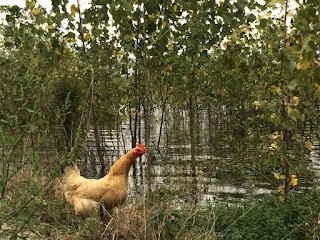One day my spouse had the idea of taking a bus around Jeju Island without any set destination. When we found a stop we felt like exploring, we got off.
Behind some hedges and a hidden road, we found a sunlit cafe.
A small clean haven of peace in the middle of our adventures.
Andrew K. Yang
Webpage of author Andrew Yang
Thursday, July 9, 2020
Chickens fed on Little Shrimps and Fish, from 连云港
At Lianyungang (连云港), my spouse's hometown, there is a chicken farm next to a river that ebbs and swells over the vegetation. The chickens, all free-range, feast on little shrimps and fish. The taste comes out in their eggs.
These are some of the best eggs I have ever tasted. When he can, my brother-in-law ships a box to me in Shanghai.
These are some of the best eggs I have ever tasted. When he can, my brother-in-law ships a box to me in Shanghai.
Subscribe to:
Posts (Atom)





